This post is inspired by one of Scribe Meets World own readers–hi Amadeo! Amadeo was interested in my posts on Sherlock Holmes, particularly its structure.
“What was the inciting incident?” was one question he had. Voila, an idea for a post on inciting incidents was born. (And we’ll get to the mysterious case of Sherlock Holmes’s inciting incident in a minute.) Inciting incidents are super important. So important they’re one of the 8 essential plot points you should have in your script outline. So…
The Inciting Incident–What is it exactly?
When people use the etymology of words in an article, I normally get annoyed because it usually comes across as either lazy or pretentious. But the etymology of “inciting” might help you understand its role in a screenplay, so it’s worth a gander.
Inciting comes from the Latin word incitare which means “to put into rapid motion, urge, encourage, and stimulate.” And that’s exactly what your inciting incident is: it’s an event that catalyzes your hero to “go into motion” and take action.
Here are other ways to conceptualize the inciting incident:
- it jolts your hero out of his everyday routine
- it is the event which sparks the fuse of your plot
- it’s something that MUST happen in order for your hook–your movie’s special premise–to kick in
UPDATE: The popularity of this article inspired me to explore inciting incidents more in depth. The result is a comprehensive, fluff-free guide dedicated exclusively to the inciting incident. You can find more details about it here!
Inciting Incident: When does it happen?
That’s a good question, a very good question. Because unlike the midpoint of your movie, which always occurs in the middle, the inciting incident can actually occur BEFORE your movie starts. But that’s a very rare occurrence. Usually, your inciting incident occurs within the first ten pages of your screenplay, after you’ve introduced us to your hero, shown us what his everyday life is like, and the six things in his life that need fixing.
Then the inciting incident occurs and it starts to change the dynamics of your hero’s life. He (or she) will react to the inciting incident, maybe even resist it, for the rest of your first act until your Act One break occurs. At the first act break, your hook kicks in and your hero commits to taking the journey (either physical, emotional, psychological or a combination of these) sparked by the inciting incident.
With some genres, the inciting incident is almost always the same. For example, in a romantic comedy, the inciting incident is the “cute meet” where the two romantic leads meet each other for the first time. In a mystery, the inciting incident is when the first dead body is found…which takes us to the inciting incident of Sherlock Holmes.
In Sherlock Holmes, the inciting incident actually occurs before the movie started. If you recall, the movie starts with Holmes in pursuit of Lord Blackwood, trying to prevent him from sacrificing a young virgin. I’d argue that the incident that sparks off the plot is when the girl’s parents seek out Holmes and ask him to find her. That is the first event that gets Holmes involved in Blackwood’s particular evil schemes.
So why didn’t the movie start there? Most likely because it’s not very cinematic. It also isn’t an event full of action and adventure, the way Holmes chasing Blackwood down just in the nick of time is. It was a wise screenwriting choice because as an action-adventure movie, Sherlock Holmes should begin with a little taste of…yes, action & adventure. Just the way a comedy should generate some laughs from the get-go.
This leads me to another point about inciting incidents–they can fall into the whole “chicken & egg” conundrum. What do I mean by that? I’ll use Sherlock Holmes because it makes for a good example. Let’s say we both agree that the inciting incident is when the young girl’s parents seek out Holmes’s help. But what about when Lord Blackwood abducts her?

Did the egg come before the chicken?
Without that event occurring, then her parents would never seek out Holmes…and he would never get involved in the case. Taking it even one step further, what about her birth? And Blackwood’s too! If they had never been born, we wouldn’t have this specific story either…
With every movie, you’re going to have to make a choice about how far back you want take the inciting incident. Good screenwriting principles that are discussed on this site as well as in many screenwriting how-to books should help you choose the best place to start your screenplay.
The Inciting Incident–What it isn’t
The inciting incident is not an active moment: the inciting incident is usually something that HAPPENS TO your main character as opposed to something he actively pursues. Throughout your first act, your main character will grapple with the inciting incident’s repercussions, and then finally, will be forced to make a choice–does he get in deeper or not?
The inciting incident is not your screenplay’s first act break: the inciting incident and the first act break are not the same thing. The distinction partly has to do with what I just discussed because usually, at the first act break, the main character makes a choice to explore whatever journey the inciting incident leads to. So the first act break is very much an ACTIVE moment for your hero.
Secondly, the first act break is also where your hook kicks in. The inciting incident and your character’s reaction to it are all set up/groundwork for the unveiling of your screenplay’s high-concept. A lot of times, after the first act break, the hero goes to a new location, which marks the beginning of his journey. Usually, the inciting incident doesn’t take your character to a new place, but instead, occurs within the context of your main character’s current habitat.
These rules are not set in stone. They’re guidelines to help make your screenwriting journey easier…which means that there are exceptions. In very rare circumstances, the inciting incident and the first act break are the same. I couldn’t think of any examples off the top of my head, but Alex Epstein cites The Wizard of Oz as an example of this in his book Crafty Screenwriting.
The tornado that takes Dorothy out of Kansas and into Oz is both the inciting incident that sparks off the fuse of the plot and also the first act break where the movie’s high concept kicks in. If you can think of any other examples where the inciting incident and the first act break are the same, please say so in the comments!
The inciting incident is not something to stress about: Identifying key plot points like the inciting incident is helpful for you, the screenwriter, because it gives you something to write towards. Instead of facing 120 blank pages, you have goals: ten pages till the inciting incident, followed by ten or so pages of the hero’s reaction to the inciting incident (usually resistance), followed by the first act break.
It’s also handy when you’re in the lucky position of selling your screenplay because studio execs LOVE identifying act breaks and such. But plot points like the inciting incident fall into the category of: one man’s treasure trove is another man’s trash bag. Basically, two different people can look at the same movie or screenplay and choose different scenes as inciting incidents or act breaks. Because it’s so subjective, it’s not something that you should spend too much time worrying about.
Remember, inciting incidents and other plot points are there to help you design a solid screenplay structure, not to hold you back.
Inciting incidents: Examples from different movie genres
Comedy: In Legally Blonde, the inciting incident is when Warner dumps Elle, instead of proposing to her as she had expected
Romantic Comedy: the inciting incident is usually the “cute meet.” The Proposal did something a little different since the two romantic leads already knew each other. So its inciting incident is when Margaret is told that she’s going to get deported
Drama: in Gladiator, the inciting incident occurs when Roman troops kill Maximus’s family. After studying inciting incidents even more, I realized that the inciting incident of Gladiator is subtler than that. It’s when the emperor, Marcus Aurelius, asks Maximus to be the steward of Rome
Thriller: in RED, it’s when the South African assassination team comes to kill Frank
Science-Fiction: in the latest Star Trek reboot (2009), it’s when Romulans kill George Kirk, James Kirk’s dad. Again, I have to change my mind! The death of George Kirk is prologue, but not the inciting incident. That actually occurs when Captain Pike asks Kirk to enlist at Starfleet Academy. (To learn more about the differences between prologue and the inciting incident, you’ll have to read my guide!)
Family: the entry of a human child into Monstropolis is the inciting incident in Monsters, Inc.
Classic: Rebecca is an example of one of those subjective inciting incidents. You could say the inciting incident is when the future Mrs de Winter meets Maxim de Winter for the first time…OR it’s when Maxim first invites her to take a drive with him…
Final thoughts
And there you have it: everything you needed to know about inciting incidents, including examples. I think I’m going try to do a series of articles along this vein, so be on the lookout for posts dedicated solely to act breaks, midpoints, and climaxes!
Fire by Shan Sheehan
Fun with an egg by Steve Johnson
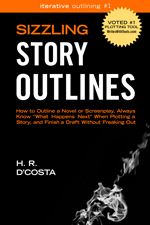










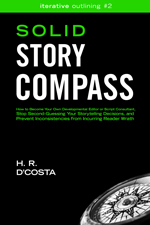
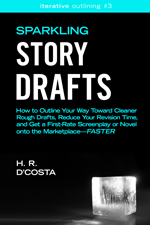
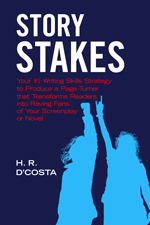
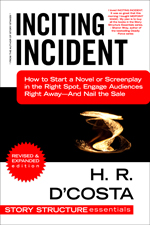
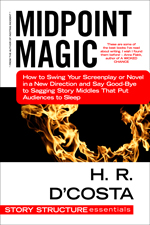
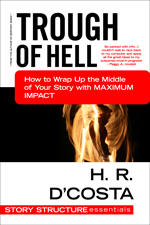

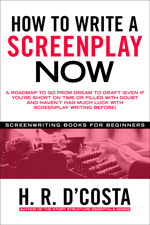
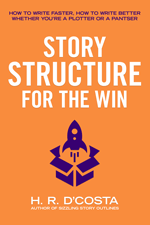

Comments on this entry are closed.
I don’t believe you’re correct about the cyclone sweeping Dorothy to Oz being the inciting incident in The Wizard of Oz (although it is indeed the first act break). What triggers the entire story is Toto’s escape from Miss Gulch. With that, Dorothy MUST keep the dog safe from her. Dorothy running off with Toto and being caught outside when the cyclone hits is actually an incidental event that occurs during Dorothy’s effort to protect Toto.
Hi Dan,
Thanks for visiting Scribe Meets World! I haven’t seen the Wizard of Oz in ages (it terrified me when I was young), so I don’t feel familiar enough with the story beats to make a case either way.
But your comment does prove two important points: one, a lot of these labels are subjective. Alex Epstein has one idea about the inciting incident in the Wizard of Oz and you have yours. I think terms like incident incident are mostly helpful when generating the structure of your screenplay. By identifying some sort of inciting incident, your first act should have a more cohesive structure.
Two, incident incidents are tricky to identify because of the “chicken or the egg” issue I mentioned in the post. Each screenwriter has to make a choice as to how far back they want to isolate an incident in the cause and effect chain, and make that incident the one which triggers the story events of their screenplay.
One thing is for sure though–if you do take the time to identify the inciting incidents and first act breaks in the movies you watch, the structure of the first act in your own screenplays should be solid!
UPDATE, 6/13/13: After studying inciting incidents even more, I’m leaning towards the Toto school of thought. Further proof that the inciting incident is a tricky little fellow!
Dan, absolutely wrong. The inciting incident in Wizard of Oz is 1,000% the tornado. The whole movie is about Dorothy trying to get home… what took her from her home? The Tornado. Life was normal for Dorothy but when Miss Gulch tries to catch Toto…. ???? That’s not the movie. Life was normal for Dorothy until a tornado took her and her dog away to a mysterious land called Oz. I don’t think this is a ‘tricky’ one up for debate 🙂
If Dan is 1000% wrong, then how come you are wrong too?
The inciting incident is the thing that sets everything in motion, it’s not plot point 2. The fact that Dorothy runs away with toto (and the actual running away is the II) sets all this stuff in motion. If she hadn’t run away, she wouldn’t have been caught in the tornado. Usually they call the first plot point the “lock in” or “point of no return” and that’s usually at the act break. In this case Dorothy running into the house and getting swept away is the actual first plot point. The start of Act 2 is when she arrives in oz. Thus she’s locked in to her adventure
I appreciate your reply to my disagreement about the inciting incident in The Wizard of Oz. Thanks for taking the time to reply. My best, Dan
Actually, no. The inciting incident in Sherlock Holmes happens about 15 minutes in, when Holmes and Watson, are informed by the police that Lord Blackwood rose from his grave, whereby forcing Holmes to reopen the case.
The opening sequence with lord Blackwood is the prequel. No different than the opening of any James Bond film, like Goldeneye, for example. The film opens with the end of one case, followed by a return to normality, then something happens which sparks a new case. In Sherlock Holmes, rather a new case, they are presented with having to reopen the last case.
Hi David,
Thanks for visiting Scribe Meets World! I like your comparison to James Bond–sewing up the loose ends from the previous installment before launching into the current adventure/mystery. But I respectfully disagree as to the plot point you have deemed to be the inciting incident. I actually think that Blackwood rising from the dead signals the first turning point and takes us into act two, when we get into the “meat” of solving the case.
Inciting incidents seem to invite a lot of controversy, more than I ever anticipated, as I’ve gotten a lot of emails about this topic. Dissenting points of view are always welcome however–and if anyone else thinks the inciting incident is when Lord Blackwood appears to have risen from the dead, please say so in the comments!
I respectfully disagree with you.
Cold Opening – Blackwood is about to kill the girl in his ritual, when Holmes and Watson stop him.
Ordinary World – Watson is moving out. Holmes is bored and in need of a case. Blackstone is executed.
Inciting Incident – Holmes and Watson are informed that Blackstone has risen from the grave.
Debate Period – Holmes convinces Watson that since he pronounced Blackstone was dead from the hanging, that his reputation is on the line. Watson reluctantly agrees to help Holmes.
Turn into 2 – They inspect the grave to find that the body in the coffin is in fact not Blackstone, but that of a red headed dwarf.
Act 2 – They are now on the case to find Blackwood again.
I do not mean to push you here, but I have wrtten 12 screenplays, 2 of which I have sold. Sherlock Holmes follows The Hero’s Journey to a “T.”
Hi David,
You’re certainly very persistent! No wonder you’ve sold 2 screenplays-congratulations, by the way!
When I read your breakdown of Sherlock Holmes’s structure, it does make perfect sense. I’m going to have to review the movie again, at least the beginning of it, before I announce a change in opinion. But for now, I’m sticking to my original guns!
That’s a very good break down. Inciting Incidences aren’t really all that hard to get, it’s usually what sets the ball rolling (I think that’s why Raiders of the Lost Ark opens with a giant ball rolling, that’s his inciting incidence — a little screenwriter humor in there).
Dear scribemeetsworld,
When does the inciting incident usually appear in Act 1?
I read a bunch of screenwriting books, like “Save the Cat,” that say it usually goes in pages 1-10. But that doesn’t always seem the case. For American Beauty, the inciting incident occurs when Lester sees his daughter’s friend, Angela, at the cheerleading competition and is immediately attracted to her. And that occurs around page 15-16.
Thanks,
Matt
Matt,
Thanks for visiting Scribe Meets World. I think the key point to remember about plot points is that they help guide the structure of your story. They’re here to help you, not stress you out!
Out of all the essential plot points, I think the most difficult one to identify is the inciiting incident–it’s certainly sparked a lot of comments here and also in my email box, probably because it’s the most subjective plot point.
The best way to think about the inciting incident is this: what happens at the beginning of the movie which changes the course of your hero’s life? If that incident didn’t occur, then your hero would have muddled along as before, and his life would be exactly the same way it was at the beginning of the movie. A good example of this is the Lord of the Rings–Frodo would have lived a peaceful, uneventful life in the Shire if Bilbo Baggins hadn’t entrusted him with the Ring. Receiving the ring changed Frodo’s destiny.
As for your example, American Beauty, it’s been, shall we say…awhile…since I’ve watched the movie. But from what I do recall, it makes sense that seeing Angela, all her youth and beauty, would have sparked Lester’s descent, and changing the course of his destiny. I know that Save the Cat says inciting incidents should occur within the first 10 pages, but that’s not a hard and fast rule. If you’re writing a longer movie–one that’s 2 hours instead of 90 minutes, you have more leeway, and your inciting incident can occur later. Same goes for the second act break.
Honestly, I wouldn’t worry too much about page numbers. But it’s a common amateur mistake to have a first act break that is overly long–and that’s when I’d be concerned. If you
spend too much time building your character’s world that you delay getting into your story, your whole screenplay will drag. This is when putting your script on the shelf to review weeks later
can be really helpful because you develop some perspective and realize that you don’t need to spend 15 pages showing us what the hero’s world is like. 7 pages is just fine.
That’s why I think Blake Snyder, among other screenwriting gurus, recommends having the inciting incident occur by page 10–if you do that, then you know you didn’t go overboard establishing
your hero’s world, delaying the end of the first act and the launch of the second, when the real meat of your story begins.
If you have any follow up questions, don’t hesitate to ask–I will try to respond more quickly!
For some reason I have a lot of trouble with clearly defining the inciting incident. Maybe I over think it? I’ll give you an example of what I mean from an old movie I recently saw on TCM – Elmer Gantry.
The basic premise is that Elmer Gantry, a small time con man, works his way into the good graces of a female evangelist then gains notoriety as a fire and brim stone type preacher.
Since the thing that serves as the catalyst for removing Elmer from his everyday life is the female evangelist would the inciting incident be when Elmer first sees a poster advertising the evangelical show or when he actually attends the meeting?
Hi MikeL,
Thanks for visiting Scribe Meets World! Inciting incidents are very subjective–100 people could watch Elmer Gantry, and 25 of them would say the incident incident was one scene, 25 would choose another, and the rest would choose an entirely different event.
You’re examining the inciting incident from a good lens though–asking yourself “what is the catalyst which removes the hero from his everyday life?”
I haven’t seen Elmer Gantry, but from your description, it seems Elmer was motivated to change after meeting the female evangelist. Without meeting her, he would have remained a small time con man. Then the second act shows Elmer’s transition from con man to preacher. The poster advertising the evangelical show seems to just be laying down the groundwork for the actual meeting between Elmer and the evangelist.
It’s like the Sherlock Holmes example–how far back do you go, because the scene you identify as the inciting incident was caused by a previous scene, and so on and so forth. So which one do you choose?
Ultimately, you make the decision. Try not to overthink the inciting incident, just identify the scene which propels the hero out of his everyday life, and move onto the rest of the first act. Remember, the plot points are there to help you, so you don’t write an unorganized screenplay which seems like a few random scenes strung together. Don’t let the plot points stress you out–use them as guiding principles that help anchor your story and ground it in sequential logic.
Good luck!
Thanks for responding. If I’m understanding correctly, you’re saying it’s less important to have a definitive point (or exact moment) for the inciting incident than it is to be aware of the reason it’s there and how it works. Is that anywhere close to right?
That seems spot on! You just want to be able to identify a point where your hero’s life starts to change in direction. Usually, the inciting incident starts to change the hero’s equilibrium and prompts him to make an active choice at the end of the first act…as he goes on a journey that never would have happened if the inciting incident hadn’t occurred. Make sense?
Can an inciting incident occur when the protagonist sees a picture of a girl and decides that he absolutely has to meet her?
Hi Dave,
That’s a great question! A guy seeing a girl’s picture could definitely be an inciting incident BUT is that the best way your inciting incident could play out? For the most part (there are exceptions) you want to aim for something dramatic and also visually exciting. Think about this: would the beginning of Notting Hill been as good if Will saw a picture of movie star Anna Scott and vowed to track her down? It’s certainly not as comedic or entertaining as their awkward, face-to-face encounters.
Of course, there’s something to be said for context. Let’s say your hero is about to be married–maybe even about to walk down the altar. Someone sends him a picture of the girl he pined for during college, and he starts to question whether he wants to go ahead with the wedding. That’s a pretty dramatic incident, even though it involves a picture on a cell phone.
You don’t even have to have the hero about to walk down the altar. If your hero knew the girl in the photo when they were younger, you could begin your screenplay by showing their relationship in the past. Then you cut to the present…your hero’s life is probably completely different than what he had told the heroine (or maybe it played out exactly the way he had wanted), but then he sees this picture of his old friend–and she’s changed in some major way. Consequently, he puts his current life on hold in order to track her down. The contrast between the heroine’s appearance/circumstances in the past and in the present makes receiving the photo more dramatic, than if the hero just received the photo out of the blue.
My suggestions might not work for the story you’re trying to tell, but I hope they guide you in the right direction!
In my screenplay, a series of events leads up to meeting the female romantic interest. That being said, it places the “cute meet” at page 25 . Is this improper to have the inciting incident occur at page 25, or should I have the “cute meet” occur at page 10 or so, and tell the prior events in the form of a flashback or a “SUPER” ,
2 years earlier.
Hi David,
At the end of the day, you have to do what’s right for your story, but I hope the guidelines below help:
–in romantic comedies, the cute meet between the hero and the heroine usually occurs fairly early on, within the first 10-15 minutes. You could delay the cute meet if you have another major story going on. Hitch is a great example of this. There’s so much comedic gold between Will Smith and Kevin James, that Smith’s cute meet with Eva Mendes is delayed for 30 minutes. If a subplot delays the cute meet, it needs to be strong enough to warrant the delay.
–Flashbacks are popular on TV…where the nature of the format is itself episodic. I’d caution against using flashbacks too extensively in a screenplay. They usually drag down script momentum. If you can start with the events from the flashback, and then launch into the present-day chronology, that usually works better. (Star Trek is a great example of this.)
–Telephone conversations are never as good as having two people talk in person. You give actors more opportunities to “act off” each other when they are in the same room. That being said, sometimes you can’t have them be in the same room in order to maintain a surprise.
Reading these blog posts should help a lot too (they address the timing of the cute meet, flashbacks, and phone calls):
Screenwriting Tips from Hitch
Screenwriting Tips from Hitch (Part 2)
6 Phone Call Scenes Which Work
Also, Writing the Romantic Comedy by Billy Mernit is a fantastic resource, if you don’t already have it.
Good luck with your rom-com!
Googling “inciting incident” has lead me to this wonderful blog, but my reason for googling still has me hot and bothered.
Have recently completed the 2nd draft of a 17 page short film script of a very cool little story that will be going into pre-production very soon. My problem is I’ve come to realize what I thought was my inciting incident isn’t(!), and the true inciting incident occurs on page 10(!).
I’ve wrestled with differing ways to have it arrive earlier, as it seems to be late and structurally should probably happen around page 5, but yet since it’s a short perhaps I can get away with it????
Hi Short & Confused,
First, let me say that it’s so cool that your story is going into pre-production soon. Congratulations! Commercials have opened the way for directors to make full-length features, and I hope your short film opens many doors for you.
Since you’re dealing with a very compressed form, I would say yes–your inciting incident needs to happen quickly. By page 2 or 3. You have to capture attention quickly and you don’t have that much time to do it.
This is a great example of the artistic irony: contrary to expectation, the shorter the work, the harder it is to create. I’d rather write a 100,000 word novel than a poem!
If you’re having trouble incorporating the inciting incident earlier, ask friends and other writers for help. They may see ways which you don’t because you’re so close to the material. Since your story is only 17 pages, it shouldn’t be difficult for you to explain it (or to corral their help)!
Good luck!
Thank you very much for the reply, confirms what I had concluded. Have come up with a way to have the inciting incident happen on page 3, basically cut two scenes (that I really liked!), and now the films going to open with an intercutting sequence cutting between an exposition laced flashback and the action leading up to the inciting incident. I think it should work just need to figure a couple of things out such as limiting the obviousness of the exposition as well as reworking/replacing the two scenes I cut since they no longer work. Thanks again for the reply!
Sounds like a solid plan!
Slightly pedantic question, but isn’t it “meet cute” rather than “cute meet”? Or are both variations commonly used?
Hi GT,
I’ve come across both, although you’re right. “Meet cute” is more common. Something about that phrasing annoys me though…so I stick to cute meet!
Hi, I am a novice writer. This is a good site, helps me a lot. I was wondering what the Inciting Incident in the movie The Sixth Sense. I’m analyzing structures and would like to know if I’m right.
I think you missed with Lord of the Rings. Since it was based on a book and books don’t follow the rules of a screenplay, (so the inciting incident may appear anywhere,) I believe the inciting incident was the interrogation of Gollum by Sauron with the words “Baggins, Shire” being what drove the all of the events. Without those two words, the events of the story may have happened years/decades later, if at all.
Hi Patrick,
Thanks for your analysis! Differences of opinion are always welcomed at Scribe Meets World.
From my perspective, “Baggins, Shire,” is a condition which facilitates the inciting incident…but it’s not the inciting incident itself.
While I agree, that the events of the story may’ve never happened without Sauron’s words, these don’t impact Frodo — not directly. That direct impact only occurs once Frodo’s uncle leaves the ring for Frodo to keep safe.
The screenplay structure vs novel debate is an interesting one. I believe that as forms of story, both actually employ similar structural patterns. It’s been ten years since I read the LOTR trilogy (!), so I don’t recall if, and how, JRR Tolkien bucked conventional structure.
But studying the modifications Jackson, Walsh, and Boyens made to the source material is what’s really important for our purposes. Their commentary on the special extended DVD edition, about the decisions they made during the adaptation process, is quite fascinating.
I agree with Patrick. The II is supposed to be the thing that sets everything into motion, it may or may not directly affect the protagonist.
For instance in Star Wars (A new hope), the II is when the star destroyer overtakes princess leia’s ship and she puts the death star plans into artoo. This had nothing to do with Luke Skywalker our main protagonist, but it sets all the other events in motion. It’s what leads to the droids escaping to Tatooine, which leads to the empire searching for them, which leads to the stormtroopers killing Luke’s Aunt and Uncle. That’s the first plot point right there, and it’s at that point his journey begins.
Hi, What would you say is the Inciting Incident for the play The Second Shepard’s Play? I’m getting 2 out of it but not sure. Thank you.
Hi Lacy,
Thanks for visiting Scribe Meets World! A story can indeed have multiple inciting incidents. There’s one for the main story (A story), as well as the subplot (B story), sometimes even a C or D story.
I haven’t seen The Second Shepherds’ Play, but from its description on Wikipedia, it seems that it does, as you concluded, have two inciting incidents: one for the sheep rescue story and one for the biblical retelling.
What about inciting incidents in multi-narrative films? I’ve written a 3-story script with a man cross over point that links the stories but it doesn’t happen till page 25! Can I add a few mini inciting incidents prior to the main event as it were in each story? They are related to the main incident for sure, just can’t seem to cut down the stories any further to get the inciting part into 12-15 pages. Cos if you think about it, each story would only have shown about 5 mins each (x3 and you have 15) and then bang you throw in the incident. Normal single story films have the luxury of at least 10 pages before the incident – each if mine only has around 5! Please help
Hi Jason M,
It seems to me that you are on the right track, you just don’t realize it! Have you studied the structure of Horrible Bosses? (There are a bunch of multi-narrative films out there, but I’m recommending this one because its structure is solid–and I watched it relatively recently.)
Going from memory here, the film takes the time to introduce the horrible everyday world of the 3 main protagonists: Nick, Kurt, and Dale. Then, each of them has their own separate inciting incident: Nick doesn’t get the promotion he had been expecting, Kurt’s nice boss dies, and Dale is blackmailed by his employer.
As a result of these combined circumstances, they hatch a plan to kill their bosses, a decision which drives the action of Acts II and III. (From what you’ve described, this would be the equivalent of the main cross-over point in page 25 of your script.)
The most important thing isn’t the timing of your inciting incident. Rather, it’s making sure you’ve provided genre elements in your script from the very beginning. So for example, if your multi-narrative film is a comedy, make sure it has some humorous elements present in the first 10 pages. If it’s a thriller, make sure there are thrills, etc, etc.
Good luck!
UPDATED TO ADD: I could’ve phrased the last paragraph better. The timing of the inciting incident is crucial…but if you lead with genre, the more flexibility you have with timing. If your multi-narrative film begins with an extensive comedic sequence, you have more leeway with the positioning of the inciting incident.
Alright I’m going to take a stab at this.
Star Wars IV: Would it be when Luke watches the hologram from R2-D2?
Zoolander: When zoolander’s friends blow themselves up?
Lord of The Rings TFOTR: When Gandalf goes to the library to research the ring?
Howdy,
Just wanted to say thank you for your website. My light got brighter.
God bless you!